Cryptocurrency, a digital form of currency that uses cryptography for security, has been gaining popularity in recent years. With the rise of digital technologies and the increasing interconnectedness of the global economy, cryptocurrency has emerged as a potential disruptor of traditional financial systems. In this article, we will explore the role of cryptocurrency in digital economic governance, examining its impact on financial regulations, monetary policy, and the overall economy.
Cryptocurrency operates on a decentralized network, known as a blockchain, which allows for peer-to-peer transactions without the need for intermediaries such as banks or government entities. This decentralization has significant implications for economic governance, as it challenges the traditional role of central authorities in regulating and controlling the flow of money. With cryptocurrency, individuals have more control over their assets and can bypass the oversight of financial institutions, leading to greater financial autonomy and privacy.
One of the key ways in which cryptocurrency is influencing economic governance is through its impact on financial regulations. Traditional financial systems are heavily regulated by governments and central banks, which impose rules and restrictions on how money can be transferred and used. Cryptocurrency, however, operates outside of these regulatory frameworks, allowing individuals to engage in transactions with greater anonymity and freedom. This has raised concerns among policymakers about the potential for cryptocurrency to be used for illicit activities such as money laundering and tax evasion.
In response to these concerns, governments around the world have begun to develop regulations specifically tailored to cryptocurrencies. These regulations aim to strike a balance between fostering innovation in the digital economy and protecting against financial crimes. For example, some countries have implemented know-your-customer (KYC) and anti-money laundering (AML) requirements for cryptocurrency exchanges, in an effort to prevent illegal activities. Other countries have taken a more hands-off approach, allowing for greater flexibility and experimentation in the cryptocurrency space.
Another area where cryptocurrency is reshaping economic governance is in the realm of monetary policy. Central banks have long held a monopoly on the issuance and control of money, using tools such as interest rates and quantitative easing to manage the economy. Cryptocurrency, however, introduces a new form of money that is not subject to the whims of central authorities. This has led to debates about the role of cryptocurrency in the broader monetary system Stock Wave AI, with some arguing that it could provide a more stable and secure alternative to traditional fiat currencies.
One of the key benefits of cryptocurrency in economic governance is its potential to increase financial inclusion. Traditional banking systems often leave out marginalized populations who lack access to banks or financial services. Cryptocurrency, with its low barriers to entry and borderless nature, has the potential to provide financial services to the unbanked and underbanked, opening up new opportunities for economic participation and growth.
Despite its potential benefits, cryptocurrency also poses challenges for economic governance. Its decentralized and pseudonymous nature makes it difficult to regulate and monitor, raising concerns about consumer protection and market stability. Additionally, the volatility of cryptocurrency prices can create uncertainty and risk for investors, potentially destabilizing financial markets.
In conclusion, cryptocurrency is becoming an increasingly important player in digital economic governance, with far-reaching implications for financial regulations, monetary policy, and financial inclusion. As governments and central banks grapple with the rise of cryptocurrency, it is essential to strike a balance between fostering innovation and protecting against risks. By understanding the role of cryptocurrency in economic governance, policymakers can better navigate the complex challenges and opportunities presented by this disruptive technology.
